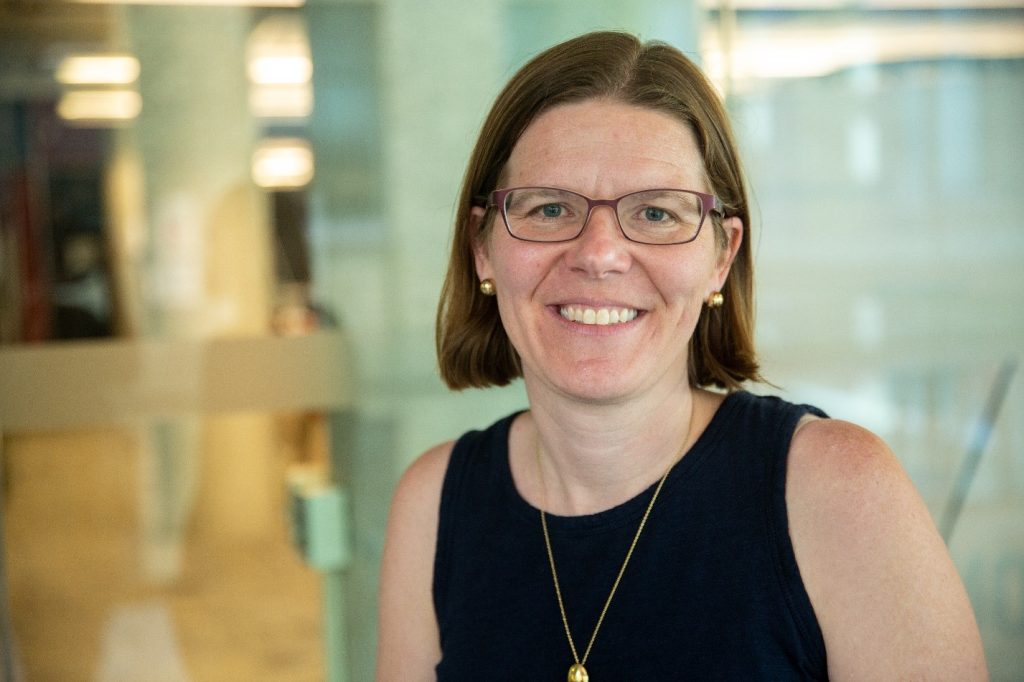
Professor Natalie Enright Jerger (ECE) has been appointed Director of the Division of Engineering Science for a five-year term beginning July 1, 2023. She succeeds Professor Peter Grant (UTIAS), who served as Interim Director for the previous six months and returns to the position of EngSci’s Associate Chair, Curriculum and Research.
Enright Jerger is an award-winning professor who joined The Edward S. Rogers Sr. Department of Electrical & Computer Engineering at the University of Toronto in 2009. She is the Canada Research Chair in Computer Architecture and was formerly the Percy Edward Hart Professor of Electrical and Computer Engineering.
Over the fifteen years of her career, Enright Jerger has received many professional accolades for her research on high-performance and energy-efficient next-generation processors. Among these, she was awarded an Alfred P. Sloan Research Fellowship and was made a distinguished Member of the ACM and a Fellow of the IEEE.
Beyond research, Enright Jerger is a strong advocate for equity, diversity, and inclusion in the field of computer architecture and the broader computing community. From 2019-2021, she co-chaired the Council on Diversity and Inclusion of the Association for Computing Machinery (ACM), and she has served as chair of Women in Computer Architecture (WICARCH). She has published on gender diversity, the climate in computer architecture and new WICARCH initiatives on ACM’s Computer Architecture Today blog.
Before taking on the role of EngSci’s Director, Enright Jerger served as EngSci’s Associate Chair, Years 1 & 2, and has taught Engineering Science students for many years in the Year 2 Digital and Computer Systems course.
She shared her vision for the Engineering Science program.
Can you tell us a bit about your role as Director of Engineering Science?
My role is to oversee the running of the program, which is a complex task given the unique “2+2” structure of our program and its diverse majors. This involves working with professors from across U of T Engineering and the university to ensure we deliver a relevant and high-quality education. I am responsible for shepherding the creation of new majors and curriculum changes, supporting student success initiatives, and managing our administrative staff.
What are your priorities or goals for the program over the next few years?
Nurturing an inclusive community is a top priority for me. We have seen such positive changes in our program over the past decade, for example the significant increase in female enrolment. But getting talented students through the door is just the first step. Supporting their success also means creating a mutually supportive community where everyone feels welcome and like they belong. This is not just important during their studies but a key perspective they will need in their careers as the engineering profession becomes more inclusive as a whole.
Another goal is identifying potential new majors for our program. There are so many complex, multi-disciplinary challenges facing engineers today. Our program’s structure allows us to pivot relatively quickly when exciting new areas of study emerge. I want to keep our program current and
I would also like to continue my predecessors’ work in expanding global opportunities for our students. We currently support summer research opportunities for about fifty of our students per year, including many positions overseas. We know what valuable experiences these are, not only for building research skills but also for developing cross-cultural knowledge and seeing engineering challenges in other parts of the world.
EngSci has always been a nimble program that responds relatively quickly to emerging areas of research. How does this impact the curriculum and student experience?
Through our upper year majors, we have an exciting opportunity to respond to changes in the engineering landscape. We can evolve our curriculum to address the intersection of what students are interested in and what various fields of engineering need. Our foundational years establish a critical breadth of knowledge, and we can layer a wide diversity of majors on top of that foundation.
What global challenges do you foresee in the coming years where EngSci graduates can have an impact?
There are many grand challenges today where EngSci graduates are highly qualified to contribute meaningfully. Climate action, sustainability, healthcare challenges such as the next global pandemic, these are just some of the urgent and far-reaching issues where engineers can play a key role. The analytical and problem-solving skills our students learn and the confidence they gain in their abilities prepare them well for tackling the big problems.
What are you most looking forward to in your new position?
Engaging with students – understanding why they came to our program, how it is working for them, how we can evolve the program. The curiosity of our students, their engagement in their education, their diverse interests and skills are inspiring and make it a joy to work with them.
Do you have any advice you would like to share with students?
Don’t be shy, reach out to EngSci’s faculty and staff. Undergraduate studies can be stressful and challenging at times and there are a plethora of resources and supports. These can sometimes be difficult to navigate, but we have a phenomenal team to help you connect with the support that works for you.
Your time in undergrad is not solely a time to deepen your knowledge – it’s a time to develop relationships, explore extracurricular interests and lay a foundation for physical and mental wellness practices that will serve you throughout your lives. So, be sure you are paying attention to all parts of your well-being and not consumed 100% with your studies.